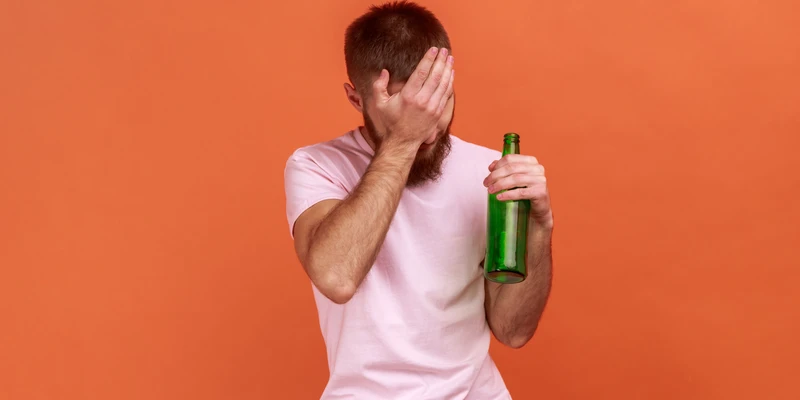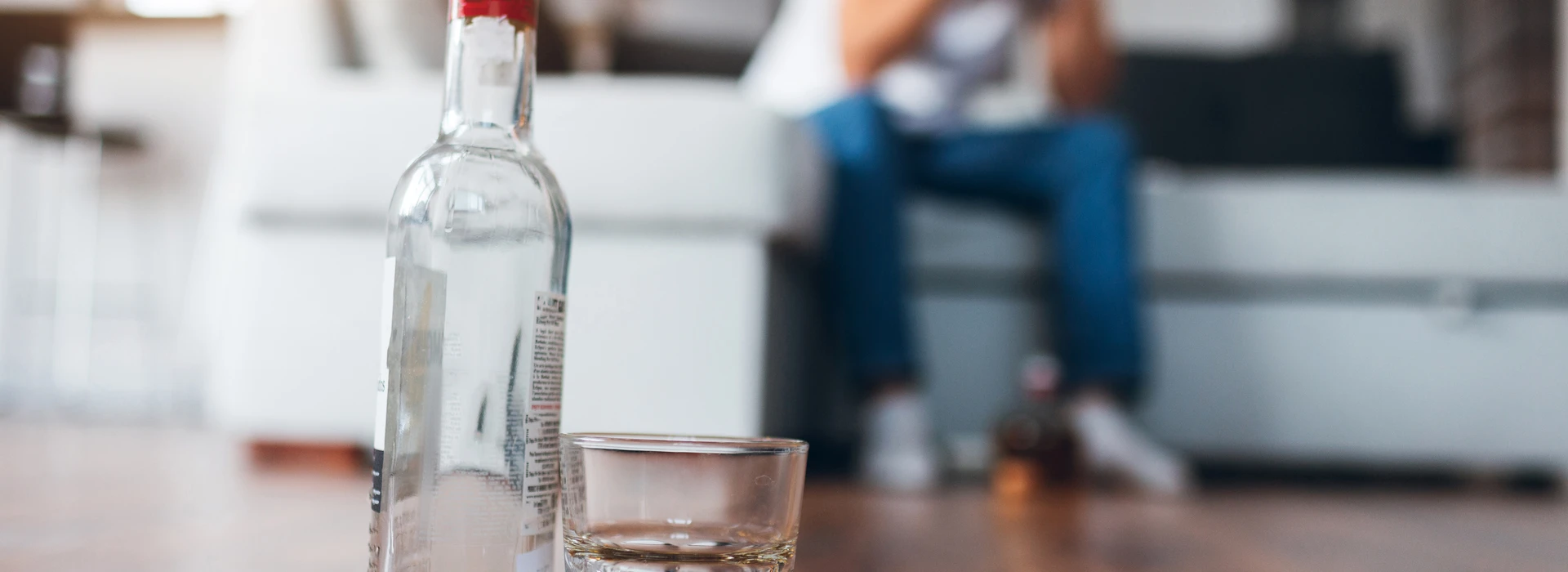- Causes of Depression After Drinking
- How Alcohol Affects Your Brain Chemistry
- Risk Factors for Depression and Alcohol Use
- How to Feel Better After the Depressant Effects of Alcohol
- Dual Diagnosis Treatment for Depression and Alcohol Abuse
- Other Treatment Options for Co-occurring Disorders
- Build Healthy Habits with Sierra Recovery

Having a drink on a night out can seem harmless, but when you go over the recommended amount, it can result in different negative consequences. Depression is one of the many emotions you may experience after drinking is depression.
Causes of Depression After Drinking
There are many reasons why drinking can result in depression. Here are some of the top reasons why.
Alcohol Is a Depressant
One of the main reasons why you feel so low after drinking alcohol is because alcohol is a depressant. It’s not in the sense that it directly causes depression. Rather, it’s a substance that can slow down brain function and interfere with mood-regulating neurotransmitters. Alcohol disrupts brain chemicals like serotonin and dopamine, which can leave you feeling sad and hopeless.
Dehydration
The brain needs to be hydrated to function well. When you’re dehydrated, you may feel tired and dizzy, which are similar feelings associated with depression. Experiencing these side effects can even intensify existing depression systems.
Alcohol is a diuretic, so it makes your body lose more fluids and eventually causes depression. You may also pee more often when you drink alcohol, which can cause you to lose not just water but also essential electrolytes.
Poor Sleep
People who use alcohol may think that drinking helps them sleep better. In reality, however, even if you fall asleep faster, alcohol disrupts REM sleep, which is the deep and restorative sleep that helps your brain and body recover. Without enough REM sleep, you wake up feeling drained and even depressed.
Hangovers and “Hangxiety”
A hangover refers to the symptoms that happen when your body can’t process the amount it can efficiently process. In addition, “hangxiety” is when you feel very anxious the morning after drinking. It’s when you feel guilty about what you did last night or don’t remember doing.
These two can lead to feelings of depression because your brain will be chemically imbalanced. You may also tend to replay conversations or regret your choices because of what happened while you were drinking.
Alcohol Dependence
Long-term heavy alcohol consumption can eventually lead to alcohol dependence. When someone is dependent on alcohol, it can be difficult to function without drinking. The absence of alcohol can then trigger unpleasant withdrawal symptoms.
One of the symptoms of alcohol withdrawal is depression. People who quit long-term heavy drinking are at high risk of mood swings and other emotions that can make them feel depressed and even suicidal. As a result, they end up drinking again to avoid these negative emotions.
How Alcohol Affects Your Brain Chemistry
When alcohol enters your system, you’ll experience a short-term surge of dopamine. This is the feel-good chemical in the brain linked to pleasure and reward. However, this surge only lasts a short time, and you quickly feel low and sad once the alcohol buzz fades.
Drinking large amounts of alcohol for a long time also has long-term effects on your brain. For instance, prolonged alcohol use can shrink areas of the brain associated with decision-making, impulse control, and other cognitive functions. These structural changes can slowly lead to chronic depression and other mental health disorders.

Risk Factors for Depression and Alcohol Use
While everyone can experience depression after drinking, certain risk factors can make someone more prone to depression and alcohol abuse. Here are some of those risk factors:
Genetics and Family History
If a person has a parent or sibling who struggles with depression and/or alcohol abuse, then it’s more likely for them to face the same problem. Certain genes influence neurotransmitter systems, and it’s estimated that around 50% of the risk of alcoholism can be attributed to genetics.
Trauma and Stress
When someone faces extreme trauma and stress in their daily life, their risk of alcohol abuse or depression goes up. For instance, someone who has experienced trauma may turn to alcohol to numb their feelings. They may rely on drinking to avoid any emotions related to their trauma. While doing so can temporarily soothe the stress, drinking as a way to cope increases emotional instability and depression.
Other Mental Health Conditions
The existence of other mental health conditions can increase the risk of developing alcoholism. Someone may turn to alcohol to self-medicate and deal with the negative effects of dealing with certain disorders.
In addition, some mental health conditions, such as anxiety and depression, may co-occur. A combination of mental health conditions can become more challenging because it can make treatment more complicated.
Environmental Factors
When it comes to alcoholism, people exposed to drinking at an early age can normalise their behaviour. They may think that drinking excessively is okay, which can lead to abuse and make it hard to stop drinking.
For mental health conditions like depression, some major life transitions can trigger depression and make it difficult to cope. Limited access to mental health resources can also increase one’s vulnerability to both disorders.
Chronic Illness
Chronic illness can cause persistent pain and exhaustion. These symptoms can seriously affect one’s mental health and make them feel hopeless and frustrated over time. The loss of independence that comes with chronic pain can trigger emotional struggles, which can leave many people vulnerable to abusing alcohol.
How to Feel Better After the Depressant Effects of Alcohol
If you feel depressed after drinking too much, there are different ways to feel better. Here are some tips on how you can feel lighter afterward:
Hydrate
Since dehydration can make you feel sluggish, hydrating properly can help you feel better. Every time you drink alcohol, you should also drink plenty of water. If possible, go for electrolyte-rich drinks to restore balance in your body faster. Remembering one glass of water for every drink is a good tip.
Get Enough Sleep
Drinking can disrupt deep sleep, but taking the time to rest and recover can help restore your brain chemistry. To do this, try to create a calming routine to signal your body that it’s time for sleep. Avoid excessive screen time and caffeine; dim the lights to create a sleep-friendly environment. If needed, sleep in. This will give your body extra time to reset and recover.
Practice Responsible Drinking
Avoid drinking too much at a time, and always remember to pace yourself. You may want to limit the number of drinks you’ll have for the night. Decide on this before you start drinking, and do your best to stick to it. Eating food before and while you drink can also slow down alcohol absorption, so it’s best that you do this as well.
Talk to Someone
If you continue to isolate yourself when you feel depressed after drinking, then it will likely exacerbate your feelings of loneliness and worsen your depression. Finding someone you trust and just talking to them can help lighten the load you feel after drinking too much. These people can offer insight and help you pull yourself out of a negative cycle.
Build Healthy Coping Mechanisms
If alcohol has become a way for you to cope with negative emotions like depression, then it might be time to build a healthy coping mechanism. Remember that alcohol is a quick fix with long-term consequences. Finding healthy and sustainable coping mechanisms to improve your mood and emotional stability is much better.
These coping mechanisms can include anything from exercising to journalling or cooking. These activities offer a healthy outlet for processing thoughts and releasing emotions. Engaging in these hobbies also helps you stay busy so you don’t rely on drinking to pass the time.
Seek Professional Help
Lastly, if you’re struggling with either depression or problematic alcohol use, then it’s always best to seek professional help. With expert support, you can get to the root of your issues for comprehensive healing. Mental health professionals and addiction specialists also create a judgement-free space where you can feel safe to talk about your feelings and emotions.

Dual Diagnosis Treatment for Depression and Alcohol Abuse
The best way to address both the symptoms of depression and alcohol use disorder is through Dual Diagnosis treatment. It’s common for people to experience both conditions simultaneously, further complicating the treatment process. These conditions can have overlapping symptoms, making diagnosis tricky.
With the right treatment, however, it will be easier to achieve long-term recovery. Dual Diagnosis treats the whole person, and clients can get a better understanding of how mental health and substance abuse are connected.
Other Treatment Options for Co-occurring Disorders
In addition to Dual Diagnosis treatment, people who struggle with both alcohol addiction and depression have other treatment options. These include:
- Outpatient Programmes: During this treatment setup, clients can still receive therapy and treatment while living at home.
- Support Groups: Peer support groups, such as Alcoholics Anonymous (AA), offer support and community for those who want to recover from alcohol.
- Evidence-Based Therapies: Cognitive Behavioural Therapy (CBT) and Dialectical Behaviour Therapy (DBT) can help reframe negative thought patterns and manage intense emotions.
- Holistic Therapies: These therapies are often combined with evidence-based therapies for a more well-rounded recovery experience.
Build Healthy Habits with Sierra Recovery
While depression after drinking may be relatively normal, frequently experiencing it or experiencing severe symptoms can indicate a problem. Quitting the habit of drinking can be difficult without the proper help, but remember that recovery is always possible.
Here at Sierra Recovery, we can help you build healthy habits and live a life free from alcoholism and depression. Our team is here to guide you every step of the way so that you can manage your symptoms. Reach out to us today to learn more about how we can help.







